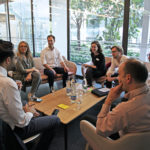What does knowledge give us and to what extent can it embody an ideal in our lives? The historian Luc Bély subtly suggests that knowledge adds depth to reality, while the philosopher Michel Serres argues that “knowledge makes you happy, knowledge makes you free“. The economist Thierry de Montbrial sees it as a remedy to counteract the two evils of the era of globalization, namely, standardization, which crushes culture, and fragmentation, which generates incomprehension.
The domination of scholars over philistines once inhibited debate, preventing the majority of individuals from helping to inform advances in thought and humanistic breakthroughs.
The digital ecosystem appears to have sounded the death knell of these scholars, jealous of their science and locked in their ivory towers. The Internet has finally brought a wealth of universal information within everyone’s reach, mirroring astonishment, curiosity and intelligence.
While knowledge is rooted in the need for emancipation, new issues are now emerging in the face of the viral nature and profusion of data. The Internet raises the question of content quality in a world become a village, where everything affects us instantly, and sometimes violently. A virus that emerged in China has devastated the entire planet, an overheated Asian industry is slowing down a huge swathe of the global economy, and a conflict between Russia and Ukraine is weighing heavily on Europe’s energy policy and consumers’ purchasing power. In its latest Worry Barometer 2022, Credit Suisse even reveals that climate change has risen to the top of the list of concerns in Switzerland, ahead of pension plans and energy.
In this context, extending knowledge beyond current affairs appears to offer a solid and liberating lever for those who wish to pursue their professional development with knowledge of the world, while respecting societal priorities and ethical responsibilities that go beyond the sole aim of profitability and career plans.
Honing skills in such a way as to be able to act from a sound analytical basis allays the challenges posed by digital technology and hyper connectivity. In addition to the delectable comfort of deep understanding, it seems to me certain that learning about new management ideas, emerging economic models, and tools for deciphering markets will offer a decisive advantage in the eyes of leaders and companies that are aware of the changes confronting them
This is precisely what Geneva EMBA sets out to do. We offer executives an advanced level of training that enables them to decipher the complex challenges and to anticipate the impact of their decisions. Both professionals and businesses with enough knowledge to identify the opportunities offered by the changing economic environment will be the architects of an era of economic, social and environmental responsibility, conducive to the restoration of real and sustainable progress.
Jean-Yves Mercier
Executive Director



